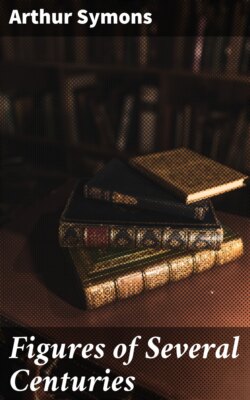Читать книгу Figures of Several Centuries - Symons Arthur - Страница 15
На сайте Литреса книга снята с продажи.
IV
ОглавлениеTable of Contents
Casanova tells us in his Memoirs that, during his later years at Dux, he had only been able to 'hinder black melancholy from devouring his poor existence, or sending him out of his mind,' by writing ten or twelve hours a day. The copious manuscripts at Dux show us how persistently he was at work on a singular variety of subjects, in addition to the Memoirs, and to the various books which he published during those years. We see him jotting down everything that comes into his head, for his own amusement, and certainly without any thought of publication; engaging in learned controversies, writing treatises on abstruse mathematical problems, composing comedies to be acted before Count Waldstein's neighbours, practising verse-writing in two languages, indeed with more patience than success, writing philosophical dialogues in which God and himself are the speakers, and keeping up an extensive correspondence, both with distinguished men and with delightful women. His mental activity, up to the age of seventy-three, is as prodigious as the activity which he had expended in living a multiform and incalculable life. As in life everything living had interested him, so in his retirement from life every idea makes its separate appeal to him; and he welcomes ideas with the same impartiality with which he had welcomed adventures. Passion has intellectualised itself, and remains not less passionate. He wishes to do everything, to compete with every one; and it is only after having spent seven years in heaping up miscellaneous learning, and exercising his faculties in many directions, that he turns to look back over his own past life, and to live it over again in memory, as he writes down the narrative of what had interested him most in it. 'I write in the hope that my history will never see the broad daylight of publication,' he tells us, scarcely meaning it, we may be sure, even in the moment of hesitancy which may naturally come to him. But if ever a book was written for the pleasure of writing it, it was this one; and an autobiography written for oneself is not likely to be anything but frank.
'Truth is the only God I have ever adored,' he tells us: and we now know how truthful he was in saying so. I have only summarised in this article the most important confirmations of his exact accuracy in facts and dates; the number could be extended indefinitely. In the manuscripts we find innumerable further confirmations; and their chief value as testimony is that they tell us nothing which we should not have already known, if we had merely taken Casanova at his word. But it is not always easy to take people at their own word, when they are writing about themselves; and the world has been very loth to believe in Casanova as he represents himself. It has been specially loth to believe that he is telling the truth when he tells us about his adventures with women. But the letters contained among these manuscripts show us the women of Casanova writing to him with all the fervour and all the fidelity which he attributes to them; and they show him to us in the character of as fervid and faithful a lover. In every fact, every detail, and in the whole mental impression which they convey, these manuscripts bring before us the Casanova of the Memoirs. As I seemed to come upon Casanova at home, it was as if I came upon an old friend, already perfectly known to me, before I had made my pilgrimage to Dux.
1902.
